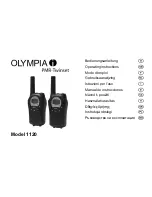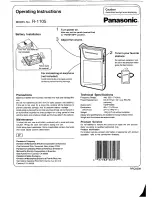
16
17
Connect the P28EBM2-M10 Headset
1.
Open the
Speaker/Microphone Jack
cover.
2.
Secure the
Headset Connector
to the
Speaker/Microphone Jack
by screwing it down
clockwise mildly.
(Screw Threads on
Headset Connector
may be
damaged if overtighten)
Note:
See Page 5 about the
water resistance
concerning.
IMPORTANT NOTICE:
WARNING:
Changes or modifications to this unit not expressly approved by the party
responsible for compliance could void the user’s authority to operate the equipment.
This device complies with part 15 of the FCC Rules. Operation is subject to the following two
conditions: 1) This device may not cause harmful interference, and 2) this device must
accept any interference received,including interference that may cause undesired operation.
NOTE:
This equipment has been tested and found to comply with the limits for a Class B
digital device, pursuant to Part 15 of the FCC Rules. These limits are designed to provide
reasonable protection against harmful interference in a residential installation. This
equipment generates, uses and can radiate radio frequency energy and, if not installed and
used in accordance with the instructions, may cause harmful interference to radio
communications.
However, there is no guarantee that interference will not occur in a particular installation. If
this equipment does cause harmful interference to radio or television reception, which can
be determined by turning the equipment off and on, the user is encouraged to try to correct
the interference by one or more of the following measures:
• Reorient or relocate the receiving antenna.
• Increase the separation between the equipment and receiver.
• Connect the equipment into an outlet on a circuit different from that to which the receiver
is connected.
• Consult the dealer or an experienced radio/TV technician for help.
Safety Information for microTALK
®
Radios
Your wireless handheld portable transceiver contains a low power transmitter. When the talk
button is pushed, it sends out radio frequency (RF) signals. The device is authorized to
operate at a duty factor not to exceed 50%. In August 1996, the Federal Communications
Commissions (FCC) adopted RF exposure guidelines with safety levels for handheld wireless
devices
Important
FCC RF Exposure Requirements: For body-worn operation, this radio has been tested and
meets the FCC RF exposure guidelines when used with Cobra accessories supplied or
designated for this product. Use of other accessories may not ensure compliance with FCC
RF exposure guidelines. Use only the supplied antenna. Unauthorized antennas,
modifications or attachments could damage the transmitter and may violate FCC
regulations.
Normal Position
Hold the transmitter approximately 2 inches from your face and speak in a normal voice,
with the antenna pointed up and away.
FCC Part 15.21 Warning Statement-
NOTE:
THE GRANTEE IS NOT RESPONSIBLE FOR ANY CHANGES OR MODIFICATIONS NOT
EXPRESSLY APPROVED BY THE PARTY RESPONSIBLE FOR COMPLIANCE. SUCH
MODIFICATIONS COULD VOID THE USER’S AUTHORITY TO OPERATE THE EQUIPMENT.
IC RSS-GEN
This device complies with ISED license-exempt RSS standard(s). Operation is subject to the
following two conditions: (1) this device may not cause interference, and (2) this device must
accept any interference, including interference that may cause undesired operation of the
device.
Under ISED regulations, this radio transmitter may only operate using an antenna of a type
and maximum (or lesser) gain approved for the transmitter by ISED. To reduce potential
radio interference to other users, the antenna type and its gain should be so chosen that the
equivalent isotropically radiated power (e.i.r.p.) is not more than that necessary for
successful communication.
The applicant is responsible for providing proper instructions to the user of the radio device,
and any usage restrictions, including limits of exposure durations. The user manual shall
provide installation and operation instructions, as well as any special usage conditions, to
ensure compliance with SAR and/or RF field strength limits. For instance, compliance
distance shall be clearly stated in the user manual.
Radiation Exposure Statement:
Any Changes or modifications not expressly approved by the party responsible for
compliance could void the user’s authority to operate the equipment.
Operation
General Specifications
Frequency Allocation and Compatibility
A = Channel No. for 22 Channel Models
B = Frequency in MHz
C = Power Output
A
B
C
1
462.5625
High
2
462.5875
High
3
462.6125
High
4
462.6375
High
5
462.6625
High
6
462.6875
High
7
462.7125
High
8
467.5625
Low
9
467.5875
Low
10 467.6125 Low
11
467.6375
Low
12
467.6625
Low
13
467.6875
Low
14
467.7125
Low
15
462.5500
High
16
462.5750
High
17
462.6000
High
18
462.6250
High
19
462.6500
High
20
462.6750
High
21
462.7000
High
22
462.7250
High
Speaker/
Microphone Jack
Secure the
Headset Connector
For Remote controller, SAR tests are conducted using standard operating positions accepted
by the FCC/ISED with the device transmitting at its highest certified power level in all tested
frequency bands, although the SAR is determined at the highest certified power level, the
actual SAR level of the device while operating can be well below the maximum value.
Before a new model device is available for sale to the public, it must be tested and certified
to the FCC that it does not exceed the exposure limit established by the FCC/ISED, Tests for
each device are performed in positions and locations (e.g. at the ear and worn on the body)
as required by the FCC/ISED.
For body worn operation, this model device has been tested and meets the FCC/ISED RF
exposure guidelines when used with an accessory designated for this product or when used
with an accessory that Contains no metal and that positions the handset a minimum of 10
mm from the body.
Non-compliance with the above restrictions may result in violation of RF exposure
guidelines.
3.
Place earbud in ear.
Wearing
Push to Talk Operation (PTT)
4.
Place the microphone about two inches (5 cm) from
your mouth.
5.
PTT:
Push to Talk (either the button on Headset or Radio).
PTT button (Headset)
Two inches
from mouth
PTT button (Radio)
Summary of Contents for microTALK PX280
Page 14: ...22 23 Notes...
































